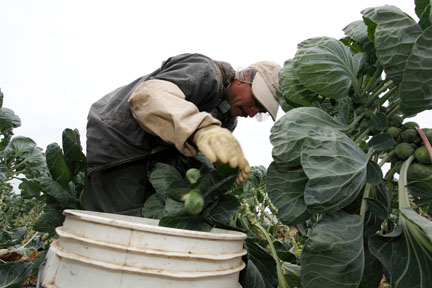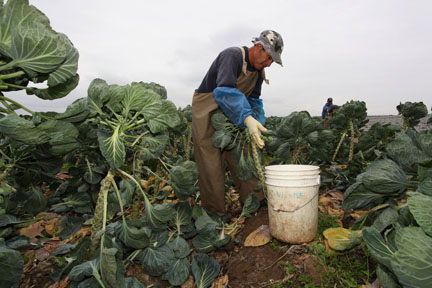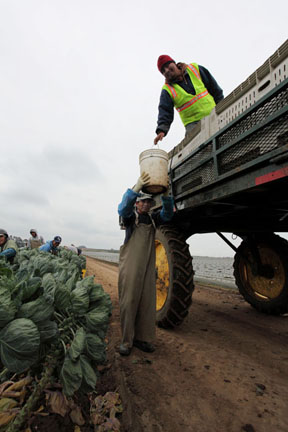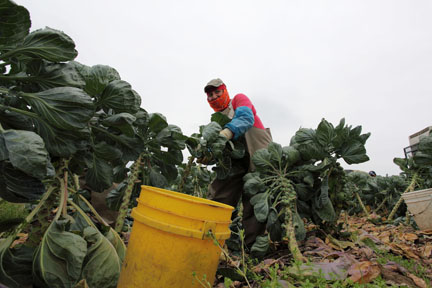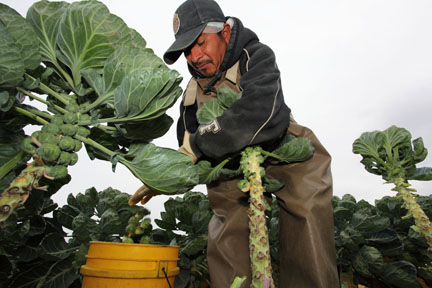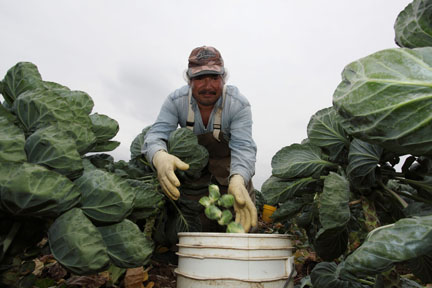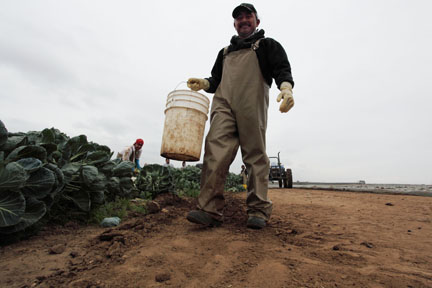From the Open-Publishing Calendar
From the Open-Publishing Newswire
Indybay Feature
The People of Watsonville 1 -- Picking the Colonizers' Vegetable
In both California and Baja California, the vast majority of the people who harvest brussels sprouts, like those who pick other crops, are Mexican. In Baja they're migrants from the states of southern Mexico. In California, they're immigrant workers who've crossed the border to labor in these fields. On a cold November day, this crew of Mexican migrant workers picks brussels sprouts on a ranch outside of Watsonville.
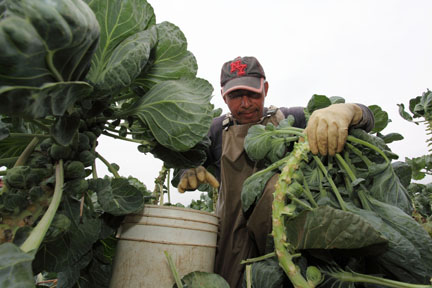
The People of Watsonville 1 -- Picking the Colonizers' Vegetable
By David Bacon
Watsonville, CA 11/19/10
The California coast, from Davenport south through Santa Cruz, Watsonville and Castroville, is brussels sprouts country. Most of this vegetable in north America comes from these fields, although a growing harvest now takes place in Baja California, in northern Mexico.
In both California and Baja California, the vast majority of the people who harvest brussels sprouts, like those who pick other crops, are Mexican. In Baja they're migrants from the states of southern Mexico. In California, they're immigrant workers who've crossed the border to labor in these fields. On a cold November day, this crew of Mexican migrant workers picks brussels sprouts on a ranch outside of Watsonville.
Many people love this vegetable, and serve it for dinner on the U.S. Thanksgiving holiday. Native people in the U.S. point out that Thanksgiving celebrates the beginning of the European colonization of north America, which drove them from the lands where they lived historically. The brussels sprouts came with the colonizers. While the Romans probably grew and ate them, the first plants came to this continent with the French to the colonies of Quebec and the Atlantic seaboard.
Today the people picking in this field may be immigrants to the U.S., but in a longer historical view, they are the descendents of indigenous people whose presence in north America predated Columbus and the arrival of the brussels sprouts by thousands of years. Now they cross the border between Mexico and the U.S. as migrant workers, many speaking indigenous languages as old, or even older, than those of the colonizers - Mixteco, Triqui or Nahuatl. In the soft conversations among the workers of this picking crew, and other crews harvesting the sprouts, you can hear those languages mixed with that of the Spaniards.
Brussels sprouts may be a colonizers' vegetable, but it has many healthy properties. It contains sulforaphane and indole-3-carbinol, both of which are believed to play a role in blocking the growth of cancer. In yet another irony, in non-organic fields, picking crews often get exposed to the agricultural chemicals that are one important cause of the explosion of cancer in the U.S. Farm workers get much higher doses than the supermarket patrons who buy the produce they pick.
But it's a job. Putting the food on the table is really one of the most important jobs people do, and one that gets the least acknowledgement and respect. So the next time you decide on brussels sprouts for dinner, first, don't boil them. It removes those healthy anti-cancer chemicals. And don't overcook them either - that's what produces the sulfur taste many people don't like. But then, when they're out there on the table, remember who got them there.
By David Bacon
Watsonville, CA 11/19/10
The California coast, from Davenport south through Santa Cruz, Watsonville and Castroville, is brussels sprouts country. Most of this vegetable in north America comes from these fields, although a growing harvest now takes place in Baja California, in northern Mexico.
In both California and Baja California, the vast majority of the people who harvest brussels sprouts, like those who pick other crops, are Mexican. In Baja they're migrants from the states of southern Mexico. In California, they're immigrant workers who've crossed the border to labor in these fields. On a cold November day, this crew of Mexican migrant workers picks brussels sprouts on a ranch outside of Watsonville.
Many people love this vegetable, and serve it for dinner on the U.S. Thanksgiving holiday. Native people in the U.S. point out that Thanksgiving celebrates the beginning of the European colonization of north America, which drove them from the lands where they lived historically. The brussels sprouts came with the colonizers. While the Romans probably grew and ate them, the first plants came to this continent with the French to the colonies of Quebec and the Atlantic seaboard.
Today the people picking in this field may be immigrants to the U.S., but in a longer historical view, they are the descendents of indigenous people whose presence in north America predated Columbus and the arrival of the brussels sprouts by thousands of years. Now they cross the border between Mexico and the U.S. as migrant workers, many speaking indigenous languages as old, or even older, than those of the colonizers - Mixteco, Triqui or Nahuatl. In the soft conversations among the workers of this picking crew, and other crews harvesting the sprouts, you can hear those languages mixed with that of the Spaniards.
Brussels sprouts may be a colonizers' vegetable, but it has many healthy properties. It contains sulforaphane and indole-3-carbinol, both of which are believed to play a role in blocking the growth of cancer. In yet another irony, in non-organic fields, picking crews often get exposed to the agricultural chemicals that are one important cause of the explosion of cancer in the U.S. Farm workers get much higher doses than the supermarket patrons who buy the produce they pick.
But it's a job. Putting the food on the table is really one of the most important jobs people do, and one that gets the least acknowledgement and respect. So the next time you decide on brussels sprouts for dinner, first, don't boil them. It removes those healthy anti-cancer chemicals. And don't overcook them either - that's what produces the sulfur taste many people don't like. But then, when they're out there on the table, remember who got them there.
For more information:
http://dbacon.igc.org/
Add Your Comments
Latest Comments
Listed below are the latest comments about this post.
These comments are submitted anonymously by website visitors.
TITLE
AUTHOR
DATE
The People of Watsonville 1 -- Picking the Colonizers' Vegetable
Sun, Nov 28, 2010 4:46PM
thanks for the insight
Thu, Nov 25, 2010 4:38PM
We are 100% volunteer and depend on your participation to sustain our efforts!
Get Involved
If you'd like to help with maintaining or developing the website, contact us.
Publish
Publish your stories and upcoming events on Indybay.
Topics
More
Search Indybay's Archives
Advanced Search
►
▼
IMC Network


